Shivneri Fort, located near Junnar, is a historical fort in Maharashtra known for its strategic significance and cultural heritage. It is best known as the birthplace of Chhatrapati Shivaji Maharaj, the founder of the Maratha Empire, born here in 1630. The fort is perched at an elevation of 3,500 feet, offering stunning views of the surrounding region. Its robust fortifications, gateways, and reservoirs demonstrate its military importance during the mediaeval period.
Shivneri Fort Location
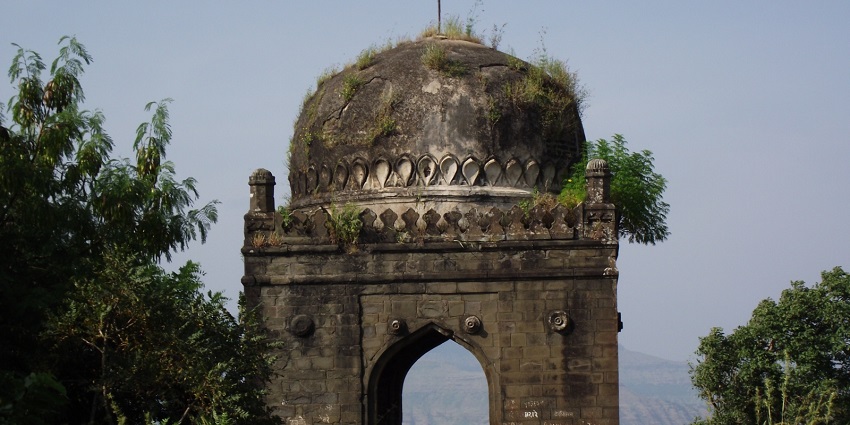
Photo: Bajirao / Wikimedia Commons
The fort is located near the town of Junnar, which is approximately 100 km from Pune and 150 km from Mumbai. Its strategic positioning on a triangular hill makes it both a natural fortification and a vantage point over the surrounding region. Shivneri Fort offers a glimpse into history while providing picturesque views of the Sahyadri ranges.
Suggested Read: Places To Visit In May In Maharashtra For A Scenic Retreat
How To Reach Shivneri Fort
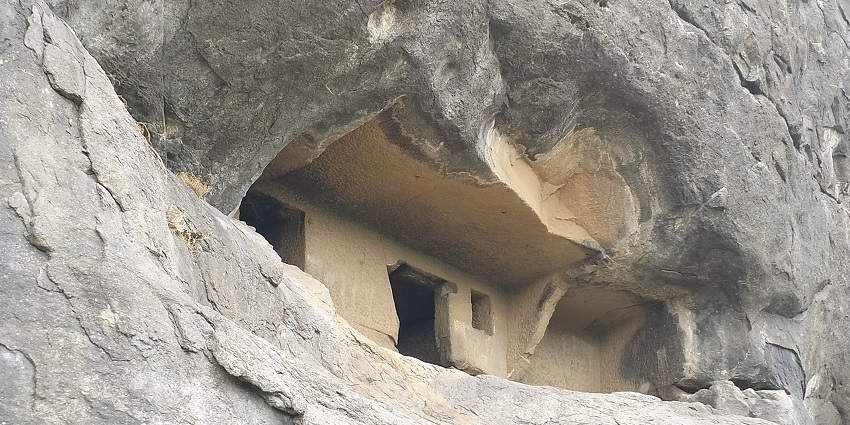
Photo: आर्या जोशी / Wikimedia Commons
By Air: The nearest airport is Pune International Airport, located about 90 km away. From there, a taxi can be hired to travel to Junnar, or one can use public transport also.
By Road: The fort is well-connected by road. You can take state transport buses or hire a private vehicle from Pune or Mumbai to Junnar. It’s a 2-3 hour drive from Pune and around 4 – 5 hours from Mumbai.
By Rail: The nearest railway station is Pune Railway Station, about 95 km from the fort. From there, you can opt for a taxi or a bus to reach Junnar.
Places to Visit Around Shivneri Fort
1. Lenyadri Caves
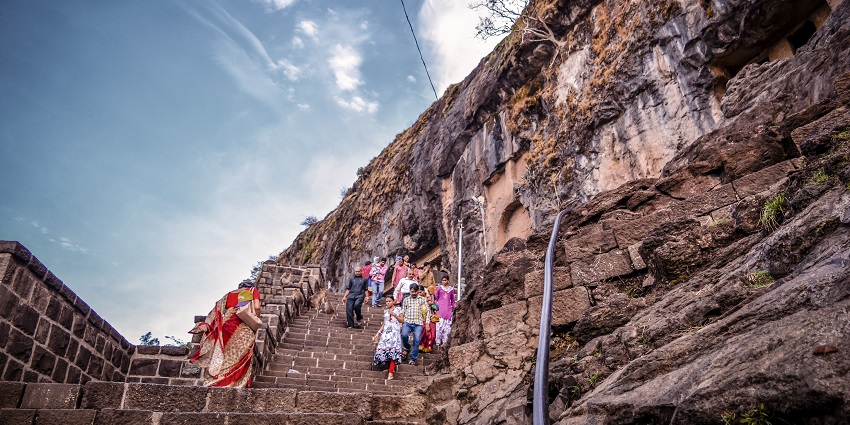
Photo: Akash Mandleek / Wikimedia Commons
The Lenyadri Caves are a series of 30 rock-cut caves close to Junnar, Maharashtra, India, from the 1st and 3rd centuries AD. The most popular cave is Cave 7. It carries a temple dedicated to Lord Ganesha. This temple is called Girijatmaj Temple and is one of the eight Ashtavinayak temples. The caves, carved into a hill, were once Buddhist monasteries (viharas) and abound with beautiful sculptures and inscriptions.
Timings: 6 AM – 6 PM
Entry Fee: Free
Suggested Read: Places To Visit In Matheran In May
2. Junnar Caves
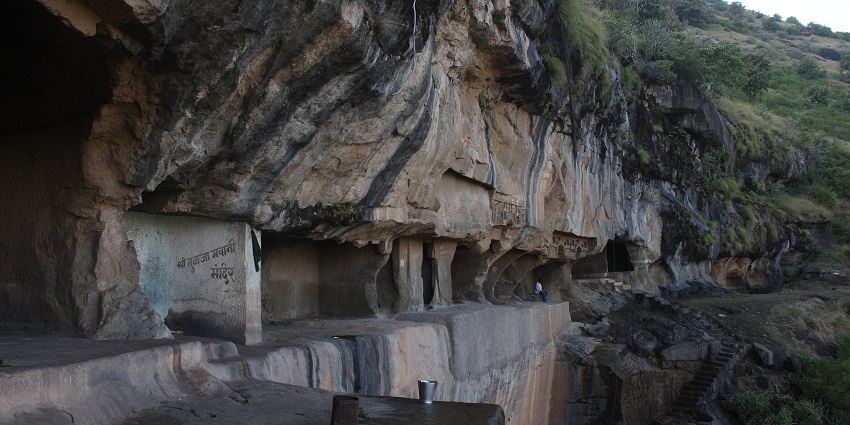
Photo: Nikhil More / Wikimedia Commons
The Junnar Caves are situated near the town of Junnar in Maharashtra, India. There are over 200 ancient rock-cut caves that date back to the 2nd century BCE. They have been classified into four distinct categories: Tulja, Shivneri, Manmodi, and Lenyadri. Most of these were Buddhist monastic centres for meditation and worship. These centres have chaityas – prayer halls, viharas – monastic cells – with intricate carvings and inscriptions.
Timings: 9 AM – 6 PM
Entry Fee: ₹25 for Indian, ₹300 for foreign nationals
3. Ozar Ganpati Temple
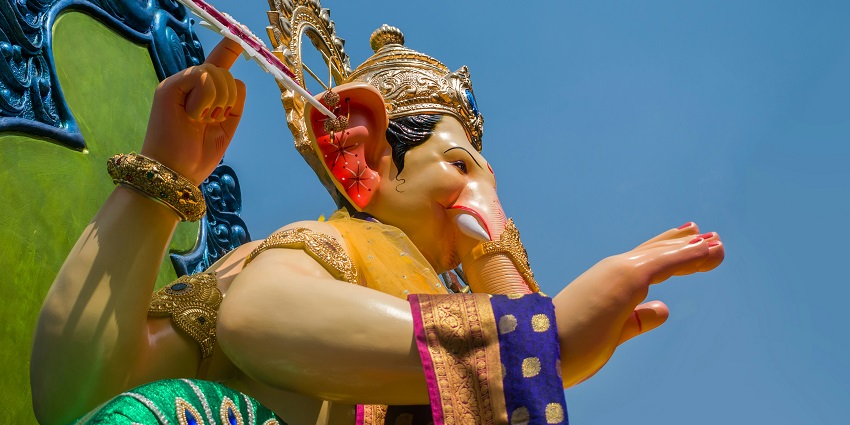
Photo: Sonika Agarwal / Unsplash / Image For Representation Only
The Ozar Ganpati Temple, located at Ozar, Maharashtra, is one of the most revered Ashtavinayak temples and is dedicated to Lord Ganesha. Here, the deity Vigneshwara, remover of obstacles, is worshipped for granting success and removing difficulties. The architecture of the temple is intricate and carries a gold-plated dome and a spacious courtyard on all sides, surrounded by very high walls.
Timings: 5 AM – 9 PM
Entry Fee: Free
Suggested Read: Places To Visit In July In Maharashtra
4. Malshej Ghat
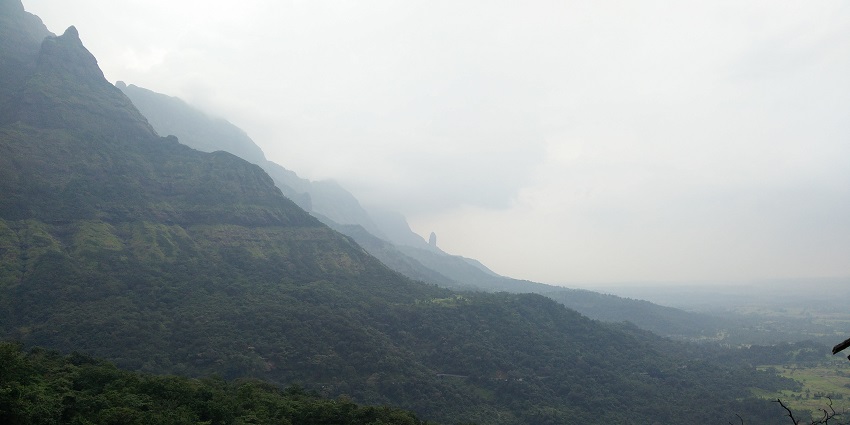
Photo: KartikMistry / Wikimedia Commons
Malshej Ghat is the most beautiful mountain pass located in the Western Ghats of Maharashtra. With waterfalls cascading down and misty hills, it is a beauty that is simply breathtaking. Nature lovers and trekkers especially like it because it offers marvellous panoramic views of lush valleys and thick forests. During the monsoon, the entire region is alive with vibrant greenery, numerous waterfalls, and the lovely flamingos, which come to spend their time here.
Timings: 24*7
Entry Fee: Free
5. Harishchandragad Fort
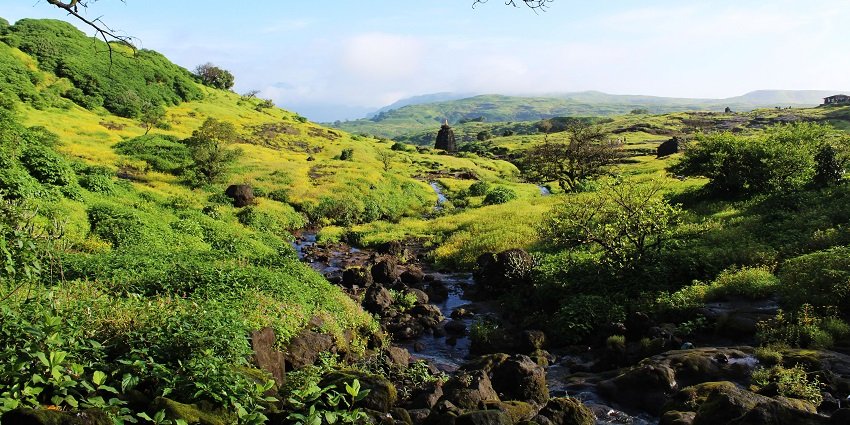
Photo: Tokendra / Wikimedia Commons
Harishchandragad Fort, a historic hill fort situated in the Western Ghats of Maharashtra, is known for its ancient architecture and matchless trekking routes. Harishchandragad Fort is about 700 years old and holds cultural importance because within the Kedareshwar Cave lies a large Shivling surrounded by water. Its dramatic cliff, which is known as “Konkan Kada,” provides views and spectacular sunsets. There are also ancient temples, caves, and carvings.
Timings: 24*7
Entry Fee: Free
Suggested Read: Places To Visit In Malshej Ghat
Where To Stay

Photo: Pixabay / Pexels / Image For Representation Only
There are various accommodation options available in Junnar, ranging from budget lodges to mid-range hotels. Popular choices include Hotel Shivneri Palace and Sai Heritage Resort. For those looking for a more immersive experience, homestays and guest houses in nearby villages offer a glimpse into the local culture. Luxury hotels are available in Pune for those seeking higher-end options.
Where To Eat

Photo: Jack Baghel / Pexels / Image For Representation Only
Junnar and the surrounding areas offer a variety of dining options. For traditional Maharashtrian food, try local eateries like Hotel Shivneri in Junnar, which serves dishes like Misal Pav and Bhakri. Pune, a short drive away, offers a more extensive range of restaurants, from street food stalls to high-end dining experiences, offering both regional and international cuisine.
Suggested Read: Illuminating Places To Visit In Aurangabad At Night
Best Time To Visit
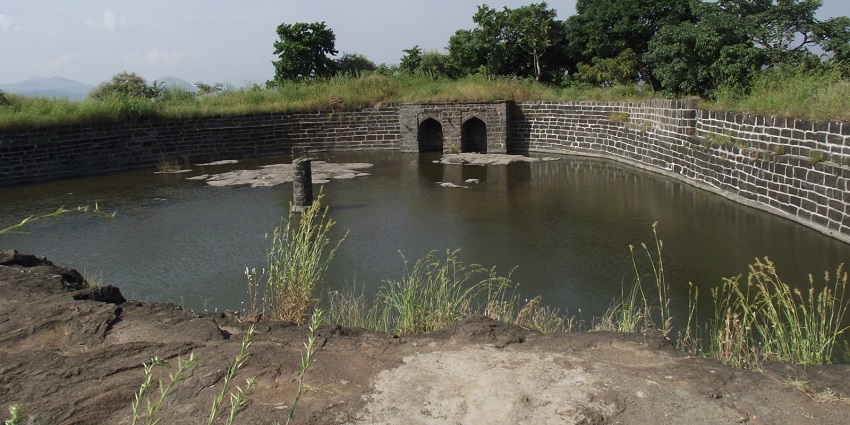
Photo: Bajirao / Wikimedia Commons / Image For Representation Only
The best time to visit Shivneri Fort is between October and March, when the weather is pleasant. During this period, the temperature ranges from 15°C to 30°C, making it ideal for exploring the fort and nearby attractions. Avoid visiting during the summer months (April to June) due to the heat, and be cautious during the monsoon season (July to September) as the fort’s paths can become slippery.
Other Factors To Consider

Photo: Bajirao / Wikimedia Commons / Image For Representation Only
Average Cost Of The Trip
The trip to the fort, including accommodation, meals, and local transport, can cost between ₹4,000 to ₹8,000 for two days. If you opt for luxury stays or guided tours, the price could increase accordingly. For foreign tourists, the cost may be higher due to transportation and entry fees to certain places.
Tips For The Travellers
- The fort has steep steps and uneven paths, so sturdy shoes are essential.
- Don’t forget to carry a camera to click amazing photos at the fort.
- There are limited food options near the fort, so it’s advisable to carry your own.
- The fort takes about 3 – 4 hours to explore, so plan your visit accordingly.
- Consider hiring a local guide to gain more insight into the fort’s history.
- Avoid visiting during the monsoon season, as the paths can be treacherous.
Shivneri Fort is an awe-inspiring destination for history enthusiasts and nature lovers alike. Its historical significance, coupled with the scenic beauty of the surrounding region, makes it a must-visit spot for travellers exploring Maharashtra. From nearby caves to scenic mountain passes, the fort offers a mix of adventure, history, and spirituality. Book your trip with TripXL today and immerse yourself in the rich cultural heritage of Maharashtra.
Cover Photo: DATTATRAY GAVHANE / Wikimedia Commons


 WhatsApp
WhatsApp
 Twitter
Twitter









